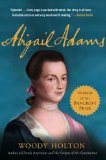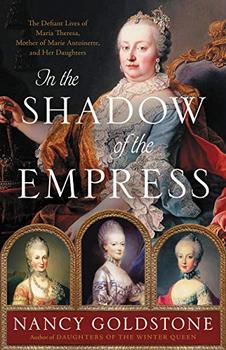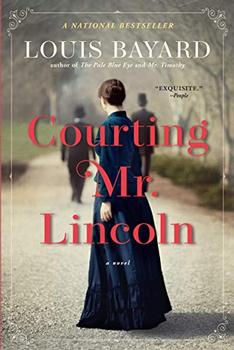Summary | Excerpt | Reviews | Beyond the book | Read-Alikes | Genres & Themes | Author Bio

Critics' Opinion:
Readers' Opinion:
First Published:
Nov 2009, 512 pages
Paperback:
Jun 2010, 512 pages
 Book Reviewed by:
Book Reviewed by:
BJ Nathan Hegedus
Buy This Book
Winner of BookBrowse's 2009 Nonfiction Book Award. In this vivid new biography of Abigail Adams, the most illustrious woman of America's founding era, prize-winning historian Woody Holton offers a sweeping reinterpretation of Adams's life story and of women's roles in the creation of the republic.
Winner of BookBrowse's 2009 Nonfiction Book Award
In this vivid new biography of Abigail Adams, the most illustrious woman of America's founding era, prize-winning historian Woody Holton offers a sweeping reinterpretation of Adams's life story and of women's roles in the creation of the republic.
Using previously overlooked documents from a host of archives, Abigail Adams shows that the wife of the second president of the United States was far more charismatic and influential than historians have realized. One of the finest writers of her age, Adams passionately campaigned for women's education, denounced sex discrimination, and matched wits not only with her brilliant husband, John, but with Thomas Jefferson and George Washington. When male Patriots ignored her famous appeal to "Remember the Ladies," she accomplished her own personal declaration of independence: Defying centuries of legislation that assigned married women's property to their husbands, she amassed a fortune in her own name.
Adams's life story encapsulates the history of the founding era, for she defined herself in relation to the people she loved or hated (she was never neutral): her mother, whom she considered terribly overprotective; Benjamin Franklin, who schemed to clip her husband's wings; her sisters, whose dependence upon Abigail's charity strained the family bond; James Lovell, her husband's bawdy congressional colleague, who peppered her with innuendo about John's "rigid patriotism"; her financially naïve husband (Abigail earned money in ways the president considered unsavory, took risks that he wished to avoid -- and made him a rich man); Phoebe Abdee, her father's former slave, who lived free in an Adams property but defied Abigail's prohibition against sheltering others even more desperate than herself; and her son John Quincy, who worried her with his tendency to "study out of spight" but who fueled her pride by following his father into public service, rising to the presidency after her death.
At once epic and intimate, Abigail Adams sheds light on a complicated, fascinating woman, one of the most beloved figures of American history.
Chapter 1
Introduction
On an unusually warm morning in the middle of January 1816, seventy-one-year-old Abigail Adams, wracked with pain and convinced she was dying, sat down to write her will. For Adams, scratching out this four-page document was, for one simple reason, an act of rebellion. The reason was that Adams's husband John, the former president, was still alive. Throughout Abigail's lifetime (which, despite her apprehensions that January morning, would continue into the fall of 1818), every wife in America was a feme covert -- a covered woman. "The husband and wife are one person in law," the English legal theorist William Blackstone had explained back in 1765; "that is, the very being or legal existence of the woman is suspended during the marriage." The most tangible manifestation of this legal "coverture" was, as Adams complained to her husband in 1782, that married women's property was "subject to the controul and disposal of our partners, to whom the Laws have given a ...
Woody Holton artfully shapes vast archives of documents and correspondence into an intimate portrait of a freethinking, clever and articulate visionary navigating the narrow perimeters of her time. Though the word did not yet exist in the late 1700's, Abigail Adams may well have been the country's first feminist. One can only imagine her nod of approval if she could see how far her "female sex" has come...continued
Full Review
(653 words)
This review is available to non-members for a limited time. For full access,
become a member today.
(Reviewed by BJ Nathan Hegedus).
Remember the Ladies
from a letter Abigail Adams wrote to her husband, John Adams, dated March 31, 1776
"I long to hear that you have declared an independency - and by the way in the new Code of Laws which I suppose it will be necessary for you to make I desire you would Remember the Ladies, and be more generous and favourable to them than your ancestors. Do not put such unlimited power into the hands of the Husbands. Remember all Men would be tyrants if they could. If perticuliar care and attention is not paid to the Laidies we are determined to foment a Rebelion, and will not hold ourselves bound by any Laws in which we have no voice, or Representation.
That your Sex are Naturally Tyrannical is a Truth so thoroughly established as ...
This "beyond the book" feature is available to non-members for a limited time. Join today for full access.

If you liked Abigail Adams, try these:

by Nancy Goldstone
Published 2022
The vibrant, sprawling saga of Empress Maria Theresa - one of the most renowned women rulers in history - and three of her extraordinary daughters, including Marie Antoinette, the doomed queen of France.

by Louis Bayard
Published 2020
From the prizewinning author of Mr. Timothy and The Pale Blue Eye comes Courting Mr. Lincoln, the page-turning and surprising story of a young Abraham Lincoln and the two people who loved him best: a sparky, marriageable Mary Todd and Lincoln's best friend, Joshua Speed.





The House on Biscayne Bay
by Chanel Cleeton
As death stalks a gothic mansion in Miami, the lives of two women intertwine as the past and present collide.

The Flower Sisters
by Michelle Collins Anderson
From the new Fannie Flagg of the Ozarks, a richly-woven story of family, forgiveness, and reinvention.

The Funeral Cryer by Wenyan Lu
Debut novelist Wenyan Lu brings us this witty yet profound story about one woman's midlife reawakening in contemporary rural China.
Your guide toexceptional books
BookBrowse seeks out and recommends the best in contemporary fiction and nonfiction—books that not only engage and entertain but also deepen our understanding of ourselves and the world around us.